Introduction
Check out the iPad Wi-Fi Repair Manual for a full set of repair guides!
We got a sneak peak inside the iPad yesterday, when we were able to un-redact the FCC's test photos. Be warned, however: what you see there is with a pre-production unit, while the photos here are from a unit purchased at retail.
Want to stay up-to-date with the hardware world? Follow @ifixit!
Our Apple iPad repair manual already has some repair guides in progress for the iPad. We hope you didn't already break your screen, but if so, that's the best place to go.
Also check out the YouTube video slideshow of the teardown!
Update 4/5: We've worked with ChipWorks to dissect the silicon inside the iPad. More photos forthcoming.
What you need
-
-
It's here! We got our hands on Apple's newest toy, the iPad, and we can't wait to see what's in it. So we won't— let's do this!
-
-
-
The iPad measures in at 242.8 x 189.7 x 13.4 mm and weighs in at 1.5 lbs.
-
The significantly improved 9.7 inch LED-backlit glossy widescreen with Multi-touch is perfect for all your movie watching, e-book reading needs.
-
The iPad's model number is A1219, which doesn't mean much. But the 3G iPad is A1337, which is rather geeky, even for Apple.
-
Yes, we did turn it on—how could we not? But then we turned it right back off and started figuring out how to pry this beautiful machine apart.
-
-
-
iPad, meet iPod original.
-
More like: Flying saucer, meet horse & buggy.
-
The iPad stacked upon a MacBook Pro, stacked upon a Dell laptop.
wtf is a dell doing so close to the precious ipad!?
Quote from Wes Cook:
Probably running Flash and taking video with a built in camera, because you know, it can multitask.
I wish there were a "like" option for comments here. I'll just create my own. ^like^
Quote from Wes Cook:
Probably running Flash and taking video with a built in camera, because you know, it can multitask.
Ha!!!!
-
-
-
Insert a metal spudger between the display and the rear case to pry the iPad open.
-
What an environmentally friendly device!
-
Arsenic-free display glass
-
BFR-free
-
Mercury-free LCD display
-
PVC-free
-
Recyclable aluminum and glass enclosure
-
Environment WIN!
Is the fron panel easy to remove?
Quote from ouimetnick:
Is the fron panel easy to remove?
It seems not. In fact the black rubber seal of the edge of the screen has some scratches.
Quote from Nobody:
Lacking naturally occurring metals is not eco-friendly. Human-friendly, but hardly eco-friendly.
Aluminium is a naturally occuring metal. Have a look at your periodic table
Quote from Dean Lombard:
Aluminium is a naturally occuring metal. Have a look at your periodic table
Er... Aluminium is extracted from bauxite which requires enormous amounts of electrical energy to produce. Ghana, to the detriment of its population, has to allocate approximately 70% of its hydro-electricity cheaply to Valco Aluminium smelters.
Quote from Dean Lombard:
Aluminium is a naturally occuring metal. Have a look at your periodic table
I don't think that's right. First, the original poster might've meant "naturally-occurring materials" not "metals".
Second, I don't think you'll ever find any metallic (i.e. elemental) aluminium lying about in the environment.
And third, The nominated baddies, PVC, mercury, arsenic, BFR (what is BFR? Do they mean "halocarbons"?) are not "naturally-occurring metal or even naturally-occurring materials". None occurs in nature in that state and PVC sure isn't natural, it's entirely man-mde.
Quote from Dean Lombard:
Aluminium is a naturally occuring metal. Have a look at your periodic table
Oh Dean. Aluminum oxidizes readily in nature, and doesn't occur as metallic ore. It is not, in fact, a naturally occurring metal. It is only a naturally occurring oxide.
The periodic table has nothing to say on the matter.
Thanks everyone for correcting my ignorance so politely :)
I was thinking "it's an element" and that was as far as my brain got
Mercury-free LCD display?
I thought it's a LED Backlit Display?
Quote from hundehausen:
Mercury-free LCD display?
I thought it's a LED Backlit Display?
It's an LCD display, and it's LED Backlit, for light!
Quote from grh:
And third, The nominated baddies, PVC, mercury, arsenic, BFR (what is BFR? Do they mean "halocarbons"?) are not "naturally-occurring metal or even naturally-occurring materials". None occurs in nature in that state and PVC sure isn't natural, it's entirely man-mde.
BFR means "brominated flame retardants", chemicals electronic components are coated with to protect them from catching fire. They are very toxic and contaminate whole landfills in e-waste.
Quote from Paul:
"ringmuscle" isn't supposed to be the one you think with. It's supposed to hold in your squirts until you can void them in the proper place (not here).
Assuming you're not a troll (which is a foolish assumption on my part, but I give everyone the benefit of the doubt) please see any of a number of good sites: skepticalscience.com is a good one, it's 100% peer-reviewed. It's a convenient list of every vacuous denier argument, along with the proper shredding of same. Bye.
For others that might be interested in this OT digression, volcanoes emit around 0.3 billion tonnes of CO2 per year. This is about 1% of human CO2 emissions which is around 29 billion tonnes per year. More facts here: http://www.skepticalscience.com/volcanoe...
Quote from ringmuscle:
You noob. You probably think CO2 is deadly for the earth and man is the cause of global warming. Typical uniformed human scum... A volcano pumps out more CO2 in 1 blow, than man does all year. 100% fact. Volcanoes go off all the time!
Man is 2% of carbon emissions. Mother nature is 98%
You enjoying sucking those media and Nazi school lessons? You love Al Gore? The guy who wants to globally tax all citizens for breathing?
CO2 is just a part of my concern.
http://en.wikipedia.org/wiki/Global_warm...
During production process, high quantity of water is used. As most of process takes part in China, industrial water aren't filtered before they are released in waterways. Digging the ore for components also makes environmental impact.
http://en.wikipedia.org/wiki/Water_polut...
All this "green product" stuff is marketing. When it comes to environment, yes, I'm some kind of Nazi. It makes my electricity bill small.
Quote from Dragan:
CO2 is just a part of my concern.
http://en.wikipedia.org/wiki/Global_warm...
During production process, high quantity of water is used. As most of process takes part in China, industrial water aren't filtered before they are released in waterways. Digging the ore for components also makes environmental impact.
http://en.wikipedia.org/wiki/Water_polut...
All this "green product" stuff is marketing. When it comes to environment, yes, I'm some kind of Nazi. It makes my electricity bill small.
And the CNC machining process consumes even bigger amounts of water and energy than conventional enclosure fabrication methods do. And the working conditions over there in Shenzhen at Focxonn's factories aren't that good as well.
Despite what everyone else is whining about on here no one mentions the fact that at the top portion of the screen in the middle, a little less than a half an inch in is a ribbon cable you need to watch out for. I didn't clip mine but came really close and as old as this thing is I'm not sure I could find a replacement.
-
-
-
Lift the display assembly away from the rear case.
-
A first peek under the hood reveals two huge Li-ion Polymer batteries taking up most of the space in this device.
looks sorta similar to taking apart an iPod touch, just a lot bigger.. that about right, or are the clips somehow fundamentally different than the Touch's?
What is that Y looking connector for? The other cool connector that is the same as the MacBook unibody machenes is for the display, but what about that Y ribbon? What does it do?
Quote from Robk732:
I broke most of my clips taking it apart. Are these clips for sale? It seems the only way to take it apart is to break the clips, then replace them before putting it back together
Why were you taking such a new gadget apart anyways. If it was defective, Apple should cover it... but opening it up kills that warranty.
Quote from Robk732:
I broke most of my clips taking it apart. Are these clips for sale? It seems the only way to take it apart is to break the clips, then replace them before putting it back together
They seem like they'd be easy enough to replace with some bent pieces of plastic with a hole made in them. Perhaps the plastic from a DVD case might do the job.
Quote from CityZ:
They seem like they'd be easy enough to replace with some bent pieces of plastic with a hole made in them. Perhaps the plastic from a DVD case might do the job.
Yeah I found a metal shop that will make them exact for me, $20 each, or $4 each if I buy 100. So i'll be checking out Home Depot to see what i can rig together.
-
-
-
Aaaand it's off. You have no idea how glad we are that this didn't require a heat gun.
-
Words from the wise: You might break some tabs getting the display assembly off.
Are those tabs metal?
How easily they bend?
So the trick is to take off the front without breaking the tabs. We're awaiting the solution. :D
PS Thanks for going through this process for us. Seems something like the bomb-disposal squad. ("What's that noise?...*kaboom*)
Why not just use a big suction cup? It worked perfect on my iPhone.
I recently had my iPhone replaced due to a camera defect. While in the Apple Store awaiting the “verdict” I watched the genius inspect every orifice using an otoscope. I assume she was looking for evidence of water damage. Have you been able to identify the materials or surfaces that they inspect on iPhones and now, iPads?
Quote from Ove Celius:
Why not just use a big suction cup? It worked perfect on my iPhone.
On the iPhone 3G and 3GS, Apple was nice enough to use visible screws instead of tabs. Since the iPad lacks screws and is held together with tabs, I think it's unlikely you could get the iPad apart with a single suction cup. We'll be working on figuring out the least invasive way to get your iPad opened up.
Quote from ent399:
Have you been able to identify the materials or surfaces that they inspect on iPhones and now, iPads?
The iPad does feature liquid damage indicators. Apple will deny warranty coverage if these are activated (they turn pink after coming in contact with moisture). There appear to be two of these on the iPad, one in the headphone jack and one near the dock connector.
-
-
-
The display has a marking referencing Honeywell patent #5280371.
-
It looks pretty barren, mostly because all the 3G equipment is missing.
-
The 3.75V, 24.8 watt-hour battery provides the juice for an advertised 10 hours of use. In contrast, the iPhone 3GS has a 4.51 watt-hour battery and the MacBook Air has a 40 watt-hour battery.
-
The USB power supply had to be enhanced specifically for the iPad. It's a 10W unit manufactured by Foxlink Technology, Ltd., part #A1357 W010A051.
The ambient light sensor and its socket to the logic board seems too huge to me. I presume it has enough room for an iSight signals.
Since it has it's own power supply, will it still charge when connected to a USB port on a PC(Or a Mac)?
Quote from Thomas J:
Who manufactured the display?
We don't know who manufactured the display from the unit in this teardown. If anyone knows, we'd love a tip. On another iPad we opened, the LCD markings were different and the panel was clearly manufactured by LG.
Quote from Luke Soules:
We don't know who manufactured the display from the unit in this teardown. If anyone knows, we'd love a tip. On another iPad we opened, the LCD markings were different and the panel was clearly manufactured by LG.
The display is Made in Taiwan by Wintek co.,ltd & Sintek co.,ltd.
www.wintek.com.tw
www.sintek.com.tw
Quote from Luke Soules:
We don't know who manufactured the display from the unit in this teardown. If anyone knows, we'd love a tip. On another iPad we opened, the LCD markings were different and the panel was clearly manufactured by LG.
I've just read that the panels come from either LG, Samsung or Epson and only the front galss panel with the touch sensors comes from Wintek, but no mention of Sintek.
-
-
-
Disconnecting the display data cable.
-
Removing these connectors is a two step process. You first have to flip up the locking bar (pictured) and can then slide the cable out of the socket.
-
The display data cable connector is the same style used in all of the new Unibody MacBooks.
That black plastic is to help remove the bar that holds the video connector, but NOT to pull on the connector itself to unplug it - it is not anchored strongly, and I'm surprised it didn't break if you did try it!
-
-
-
Disconnecting the volume, power, and screen rotation lock buttons connector.
-
-
-
-
The main board is secured to the back panel by T4 Torx screws.
-
We have never seen Apple use screws with a bit this small before.
wow, that is small for these. the machinery gets bigger, the screws get smaller.
Is iFixit going to carry the T3? how about the glass?
Quote from Travis Funk:
Is iFixit going to carry the T3? how about the glass?
It appears that iPad screws may actually be T4. I used a T3 bit, but others have reported success with a T4 bit. Fortunately, we include both T3 and T4 bits in the 54-piece kit that we already sell. We don't have the iPad glass yet, but we're definitely hoping to offer it in the near future. It looks like at least one person needs a replacement glass already.
-
-
-
Top and bottom of logic board with the EMI shield on.
-
It looks like this board was made by AT&S. We haven't seen Apple's PCB manufacturers brand their boards before.
-
The logic board is about 4.5" wide, spanning about 60% of the iPad's width.
The marking is the board manufacturer's UL mark. You should find it on all Apple boards (all everybody's boards), although often it likely to be underneath a component.
-
-
-
Remove the EMI shield from the logic board, and presto!
-
This board is markedly different than the pre-production board we uncovered.
-
Markings on the A4:
-
N26CGM0T 1007 APL0398 33950084 YNL184A2 1004 K4X2G643GE
-
Yes, the K4X2 is a Samsung DRAM part number!
-
Decoding the part number shows there is 2Gb of memory inside. This translates into ~128MB of memory per die, for 256 MB total. (NOT 512MB, as we previously reported.)
-
This means the A4 processor is probably being manufactured by Samsung.
-
The DRAM was stamped at the end of January, while the processor die was likely manufactured the third week of February.
The Apple A4 has the cool markings like the marketin photo. The FCC A4 didn't have that. Sadly, it's printed in the wrong direction.
Is Apple using Sandisk iNand chips for flash memory?
They're 64Gbit MLC NAND flash.
In fact you can switch between brands like Toshiba, Micron, etc (We've done this before on 2G and 3G iPhone at iPhoneTECH), and it's possible to upgrade to higher density memories, i.e. 128 Gbit, 256 Gbit and possible to 512 Gbit chips, it means you may upgrade to 128 GB capacity when the memories become available. That would be terrific!
K9 = NAND memory
L = MLC DDP
CG = 64 Gbit
08 = 8x
U = 2.7V~3.6V
1 = Dual nCE & Dual R/nB
M = !st Gen.
Quote from Tom Stigler:
Is Apple using Sandisk iNand chips for flash memory?
The A4 is likely a multi-die package, with the CPU and DRAM mounted on the same substrate. (High-speed logic and high-density memory require fabrication processes that are less-than-optimal for the other.) That would explain the multiple part numbers. Other folks have pointed out that the K4X2G643GE part number is for a 2Gb (256MB) part.
Quote from CityZ:
Hmm, I also can't seem to account for the small ribbon cable connector that's next to the big double-ribbon connector for the touch-screen.
It's for the headphone jack, seen here.
Sheesh! 2 Gigabits is 512 MB? Since when is a Byte only 4 bits? It's 256 MB of RAM and that goes in line with reports from developers who had their apps rejected for memory warning crashes, which occur at a comparable RAM usage as on the iPhone 3GS.
I wrote about that here: http://www.gaminghorror.net/steffenj/app...
Ok we're looking at two chips here, i get it. 2 Gigabits per chip times two equals 512 MB. But why are developers seeing only the same free amount of memory as on the iPhone 3GS? Why would the iPad keep about 256 MB to itself?
Quote from Steffen Itterheim:
Ok we're looking at two chips here, i get it. 2 Gigabits per chip times two equals 512 MB.
That's what we originally thought, but it turns out there are two 1 Gb chips, for only 256 MB total. Consistent with software reports. Sorry to get your hopes up!
Quote from Kyle Wiens:
That's what we originally thought, but it turns out there are two 1 Gb chips, for only 256 MB total. Consistent with software reports. Sorry to get your hopes up!
I guess given the software reports, there's no holding out hope that the 2Gb part number refers to each individual DRAM chip inside the A4 rather than the 2 combined?
In any case, can you confirm my interpretation of Samsung's nomenclature that the "64" in K4X2G643GE refers to a 64-bit memory bus width? If that is so, that means that regardless of RAM amount, the iPad has double the memory bandwidth of the iPhone and other smartphones which Anandtech reported to have 32-bit memory buses in their Google Nexus One review. The doubled memory bandwidth would benefit not only the CPU but also the GPU which shares system memory and bandwidth.
It seems A4 is not (yet) revolutionary product, but upgraded version of A8 based processor found in iPhone 3GS.
On FCC RAW data logic board photos of iPad it is clearly seen that the processor, not yet marked as A4 but in old, iPhone style, is manufactured during week 49 of 2009.
In addition, Apple part number of A4, APL0398, is quite similar (upgraded?) to original iPhone 3GS processor PN APL0298.
I was confused about the amount of memory, but the pictures on the Chipworks page cleared that up.
The number in the outside, K4X2G643GE, indicates 2 gigabits (256MB) total, 64 bits wide. The numbers on the inside, K4X1G323PE + K4X1G323PE, indicate 1 gigabit (128 MB) on each die, 32 bits wide.
That's awsome. Is it possible to buy a 128 Gbit MLC NAND flash now?
Quote from Cristian Flores:
They're 64Gbit MLC NAND flash.
In fact you can switch between brands like Toshiba, Micron, etc (We've done this before on 2G and 3G iPhone at iPhoneTECH), and it's possible to upgrade to higher density memories, i.e. 128 Gbit, 256 Gbit and possible to 512 Gbit chips, it means you may upgrade to 128 GB capacity when the memories become available. That would be terrific!
K9 = NAND memory
L = MLC DDP
CG = 64 Gbit
08 = 8x
U = 2.7V~3.6V
1 = Dual nCE & Dual R/nB
M = !st Gen.
-
-
-
A shot of the logic board minus the steel EMI shield.
-
The manufacturer of the memory has switched from Toshiba on the FCC teardown to Samsung on this device.
-
Samsung K9LCG08U1M 8 GB NAND flash.
-
We love how much easier Samsung's chip numbers are to interpret.
-
Broadcom BCM5973 I/O controller.
-
The Apple A4 is marked up much nicer than the part in the FCC photos from yesterday.
-
Texas Instruments CD3240A1 touch screen controller.
-
NXP: L061 01 4 ZSD950
Also, next to the light-sensor connector at the top, you'll see empty spaces for a tiny 25-pin BGA chip and a 6-pin connector. If I had to hazard a guess as to their purpose, I'd say the chip is camera-related, and perhaps converts the raw camera output to USB, and the 6-pin connector brings out the USB input for testing.
Quote from CityZ:
...and perhaps converts the raw camera output to USB, and the 6-pin connector brings out the USB input for testing.
Can anyone measure the pad pitch of the BGA? If it's 0.50mm, it would fit the SMSC USB3311 or another in-family. The 24-pin connector there would support the 12 signals for ULPI to a camera.
If I had to guess, I'd say that the NXP part is a CBTL06141EE display mux/demux. Oddly it's the only part in the series to have a datasheet marked as confidential.
Well, i read somewhere that the Apple A4 chip contains the Processor, Memory Controller and the Graphics. (I am not sure)
If so, it will generate more heat. But, where is the HEAT SINK for it...? So, does the iPad will have a shorter life because of no heat sink...?
A friend of mine remarked to me: "First thing I thought of when I saw the iPad was that it seemed like a nice alarm clock.
Well, I take it back. IT HAS NO F-ING CLOCK BUILTIN!
http://www.guardian.co.uk/technology/201...
It cannot wake from sleep on an internal alarm. Apparently it cannot
run an alarm clock in background!"
I couldn't believe that - what, no permanently running RTC? To save parts costing under a dollar, they made a big expensive computing device that doesn't know the time and date?
But now I'm looking at that main board more closely, hmmm.... I don't see any 32768Hz crystal. You know the ones - a tiny metal cylinder with two leads, as found in every watch, cheap desk clock, and computing device that, you know, CAN tell the time.
Just possibly the crystal could be in a small rectangular ceramic case, but I don't see any candidates for that either.
This is completely ... beyond absurd. Bizarre. What were they thinking? It really makes me wonder...
With Steve Jobs being on death's door and all, I wonder if he's maybe doing a big 'fu*k youse all' farewell gesture? And the iPad (feminine hygiene name _intended_) is the raised finger?
In six months, all iPads brick themselves, with a permanent, unremovable goatse image. Signed "So long suckers! Thanks for all the cash. S Jobs" And then a deliberate internal short circuit makes the battery explode.
Fortunately, that worry can't be real. Since the iPad doesn't know the date. Err... unless it's online, I suppose.
-
-
-
A reverse shot of the logic board.
-
The gold strip on the curved edge most likely helps ground the board against the "steps" cut into the aluminum rear case.
-
Apple part #820-2740-A.
-
The Apple-branded IC on this side of the board is labeled 338S0805.
It seems the copyright for that board is 2010. It also seems the logic board manufacture has printed their brand. Even on a production board.
How much RAM does it have? That is the burning question for me. Without a swap file a machine with fixed ram will crash a lot if it doesn't have breathing room. 1st gen iPod touches where under-rammed and can't run a lot of software as well as later models. With such a huge screen you gotta have enough ram. 512MB is what i predict, apple is notorious for using as little as possible to save money.
Quote from Abit:
Can you snap a pix of each button assembly inside the device? It looks like some of the assemblies are glued to the aluminum housing like the original iPhone. Is this the case?
The original iPhone had buttons such as the sleep/wake, volume up and down, and the silent/ringer switch were all held on to the aluminum back with screws.
Quote from ouimetnick:
The original iPhone had buttons such as the sleep/wake, volume up and down, and the silent/ringer switch were all held on to the aluminum back with screws.
The original iPhone's back was a stamped aluminum case plus a glued-on cast metal frame, along with a tack-welded metal screw bracket. The buttons and other pieces screwed into the frame that was glued onto the back. The main problem with this was that all the Chinese replacement parts makers advertising on Ebay were selling the plain back case without the frame and other parts necessary to use it. Also, sometimes the frame would become partially unglued from the back when you opened the phone.
The iPad should not have these issues, as the back is a solid hunk of aluminum (though it does have some tack-welded screw mounts). I do foresee iFixit and others selling lots of replacement screen clips that hold the unit together, though.
which brand is it using for its capacititive touch screen?
Quote from ekbart van der klunk:
How much RAM does it have? That is the burning question for me. Without a swap file a machine with fixed ram will crash a lot if it doesn't have breathing room. 1st gen iPod touches where under-rammed and can't run a lot of software as well as later models. With such a huge screen you gotta have enough ram. 512MB is what i predict, apple is notorious for using as little as possible to save money.
And yet, they still charge as much as possible. (Sorry, I'm a PC guy, though I don't despise Apple - I have an iPod Touch. I just don't agree with all of their business practices.)
This a Dual Battery switching charger for two battery similar to LTC1760
-
-
-
Removing the single screw securing the dock connector cable to the rear case.
-
Notably lacking from this RF/data cable is anything GPS related. Check out the FCC iPad teardown to see where the GPS will be in the 3G device.
-
-
-
The 802.11n WiFi/Bluetooth card is integrated into the dock connector cable.
-
Hiding under the case:
-
Broadcom BCM4329XKUBG 802.11n WiFi + Bluetooth 2.1 + EDR and FM
I wish Apple would enable FM reception, or a least broadcasting to a local (car) radio. Anyone know of an iPhone hack?
That 'capacitor' looks like it is more likely an SMD ferrite monolithic inductor.
Do you know if the solder is tin/lead, or some dreaded rohs high melting point solder?
Quote from TerraHertz:
That 'capacitor' looks like it is more likely an SMD ferrite monolithic inductor.
Do you know if the solder is tin/lead, or some dreaded rohs high melting point solder?
Edit: Ah, the answer to that is obvious from the center pic. You had to heat the metal case with a blowtorch to unsolder it. So, ROHS solder. Which cannot be resoldered without destroying parts. Sigh...
As if bismuth was any better in landfills than lead.
Quote from amiller770:
I wish Apple would enable FM reception, or a least broadcasting to a local (car) radio. Anyone know of an iPhone hack?
There is no hardware to support FM transmission (only receive) and just because the Broadcom chip has an FM demodulator, doesn't mean that you have enough hardware to support FM reception. You need a substantial set of antenna tuning components, not to mention the antenna itself. Those pins are not broken out of the logic board so it would be near impossible to implement this mod -- even if you were willing to open your new iPad and take a soldering iron to it!
-
-
-
The speaker assembly is larger than we expected:
-
The connector found on the speakers and other components is typical of the connectors seen in MacBook Unibody laptops. Translation: the iPad isn't that cramped for space.
-
Dual speakers provide mono sound. Two small sealed channels direct sound toward three audio ports carved into the bottom edge of the iPad. The audio-out jack provides stereo sound, of course.
You claim the two speakers are monophonic. Yet, in this review...
http://www.pcmag.com/article2/0,2817,236...
...the author claims that the speakers are delivering two channels:
"The small grille houses both a left and right speaker. Does this mean you will hear distinct stereo separation? No. The speakers are too close together for human ears to hear any separation, but the fact that there are two channels means no audio is lost, as is often the case when stereo mixes are played through mono speakers."
How do you respond?
My question is to know the speaker manufacturer.
I think Foster Electric Co., Ltd..
http://www.foster.co.jp/en_products/micr...
http://www.foster.co.jp/en_products/micr...
Is it the part of this manufacturer?
-
-
-
That's a hulk of a battery: it weighs 148g with the casing.
-
Confirming our suspicions from yesterday, the battery integrates two separate 3.75V lithium polymer cells wired in parallel for such ample battery life.
-
Battery cell markings:
-
P11GA6-01-C01F
-
741-00310A +
Ah, like the new iMacs, the Wi-Fi antenna is behind the Apple logo in the bottom case.
Quote from ivc:
On the battery itself it states "Li-ion".
As stated on the black cover, it is a lithium-ion polymer battery.
-
-
-
The iPad battery is a lot bigger than an iPhone 3G battery. The iPhone battery has about 1/5th the capacity provided by the iPad battery.
-
The second shot shows the battery cover peeled back to expose the protection and connection circuitry for each Li-Poly battery.
-
The third shot shows the other side of the battery board, which is stamped with Compeq.
You mention that the ipad has 2 3.7 volt li-poly batteries. Other wise know as li-po.
Li-po as I know it is still fairly unstable and if the voltage per cell drops to low it can cause damage to the cell.
I rac RC with li-po and have seen them catch on fire.
But looking at the pictures I beleive it's printed on the battery case as li-Ion.
Maybe a miss print in step 22? Maybe it should say Li-Ion?
Don't get me wrong, it will be a great day when Li-Po is more stable for electronics.
Ipad usage could be 20 hours insted of 10.
Scott
I stand corrected now that I have seen the full picture on a computer and not my phone.
I wonder how they are going to prevent the cells from dropping under 3 volt before they take on damage.
If you own one I would recommend never letting it die all the way. And keep about half charge on it if you are going to not use it for a while. These batteries are great but temperature affects them a lot.
Store at room temp. I would not leave it in your car on a hot summer day or a cold winter.
Quote from scott d:
I stand corrected now that I have seen the full picture on a computer and not my phone.
I wonder how they are going to prevent the cells from dropping under 3 volt before they take on damage.
If you own one I would recommend never letting it die all the way. And keep about half charge on it if you are going to not use it for a while. These batteries are great but temperature affects them a lot.
Store at room temp. I would not leave it in your car on a hot summer day or a cold winter.
Don't worry about it. The control circuitry is extremely sophisticated and will not let it go too low or high. Besides, Li-Poly has been used in many consumer devices, including MacBooks (you won't believe me, but it's true), for years now.
-
-
-
The bare rear case. The antenna behind the apple logo looks just like the antenna on the new iMacs.
-
A little prying with a metal spudger is required to separate the antenna from the rear case.
-
Tolerances look pretty tight in the antenna compartment. Check out that pocket just for the antenna to sit in.
Quote from Jasiu:
How much does the bottom case weigh ? Battery + glass + lcd is 494g. So it should be about 150g. Is it ?
I just weighed the aluminum back by itself. It's 138 grams, which is almost exactly 20% of the iPad's total weight.
Any idea what the scalloping on the back of the case is for? I mean, it looks pretty... is it due to the CNC machining process, or to more easily stabilise and lock the boards etc. into it, or..?
-
-
-
Here's a detail shot of both WiFi antennas. The wireless reception should be decent with such dense antennas.
-
Adding 3G capability to a Wi-Fi only iPad is not going to be a very feasible upgrade. Based on the photos released by the FCC, the 3G models include additional antennas as well as a plastic strip in the rear panel to improve reception.
Quote from Jeff:
I haven't seen any mention of the microphone, but my assumption is that this is part of the headphone jack assembly (that small hole directly adjacent to the headphone jack).
Yes, the microphone is right next to the headphone jack, and the signal goes through the same ribbon cable as the headphone jack.
-
-
-
Remove a couple screws and pull the headphone jack out of the rear case.
-
As with most portable devices, the headphone jack is very well fastened to the case.
-
The microphone's right next to the headphone jack and goes through the same data cable as the headphone jack.
Quote from CityZ:
If Apple were more pro-consumer, they could engineer their products to be more water resistant. Instead, it almost seems as if some of their products (the notebooks) are designed to be damaged when spilled upon. A moisture barrier under the keyboard would've saved many headaches.
Nothing you've stated has anything whatsoever to do with "pro / anti consumer".
To the issue; unfortunately, barriers where you describe to keep moisture out; also keep heat in.
-
-
-
Ants on parade? Nope, just the T4 Torx screws holding each tab to the display assembly.
-
Luckily, the home button is a digital switch with its own circuit board, making replacement that much easier.
It's nice to see the Home buttom can be easily repaired/replaced
Is that a space for an iSight camera?
Dudes, that sound hack could be sweet, IPAD BOOMBOXES ANYBODY?
POSTED BY IP
Quote from Ian P freely:
Dudes, that sound hack could be sweet, IPAD BOOMBOXES ANYBODY?
POSTED BY IP
umm i am in!
-
-
-
Disassembling the display assembly.
-
A thin ribbon cable connects the LED driver board to the LED backlights.
-
The LED driver circuitry and the interconnects between the actual LCD and the display data cable connector are contained within the same circuit board.
Maybe that tape will prevent dust from entering... I sure hope it does.
It is gonna be awesome if there is also a teardown video~
Quote from jackwong64:
It is gonna be awesome if there is also a teardown video~
There should be a teatdown slideshow with funky music, but they never did a video before. it would be nice to see one though.
-
-
-
The ambient light sensor lives in a compartment that a camera would love to call home.
-
We suspect that this compartment was intended for the ambient light sensor all along, and the rumors of a camera that would fit here were overzealous. The layout does look very similar to the camera's view ports on the MacBook Pro 13" Unibody.
Quote from Dragan:
Some phone uses VGA camera as light sensor. Is the same case?
No, a VGA camera would have a lens assembly and a different looking sensor. An ambient light sensor usually is just a LDR, a light dependent resistor which decreases its resistance the more light falls onto it. Or it is kind of a primitive solar cell which transfers the light to electric current detectable by the device.
Quote from Thomas J:
No, a VGA camera would have a lens assembly and a different looking sensor. An ambient light sensor usually is just a LDR, a light dependent resistor which decreases its resistance the more light falls onto it. Or it is kind of a primitive solar cell which transfers the light to electric current detectable by the device.
I know how foto-sensitive elements works very well, but THIS particular sensor have more than two(three) output, as photo resistors/diodes or cells have.
Quote from Dragan:
but THIS particular sensor have more than two(three) output, as photo resistors/diodes or cells have.
I know that resistors and diodes need only two pins. That also confused me a little bit before. But for 640 x 480 the sensor's aspect ratio isn't appropriate. And for a proper CCD or something similar there are too less pins. Even the very low-res IR-sensor in a wiimote is connected by 8 pins. Maybe its sort of a photodiode array.
Quote from Dragan:
THIS particular sensor have more than two(three) output, as photo resistors/diodes or cells have.
Resistors and diodes have two leads, but a lot of ambient light sensors have a built-in amplifier or analog-to-digital converter to make integration easier. For example, see the Toshiba TBS852. Even if the device doesn't have an amplifier, it's common on small packages to have extra leads whose only function is mechanical. But, since there is a capacitor next to this package, it probably has this extra circuitry.
Quote from Thomas J:
I know that resistors and diodes need only two pins. That also confused me a little bit before. But for 640 x 480 the sensor's aspect ratio isn't appropriate. And for a proper CCD or something similar there are too less pins. Even the very low-res IR-sensor in a wiimote is connected by 8 pins. Maybe its sort of a photodiode array.
Ok. At one moment, I thought that maybe it have serial bus or something, but it is too small. I think morcheeba is right.
Quote from Miner:
I heard through a friend that the ambient light sensor is from a company in Texas....didn't say the name. Does anyone know if this is correct?
He might be thinking of Taos. I've worked with their color and light sensors before, and the pictures do look like their product. But then again, a 6-pin SOIC encased in in optical epoxy could be any company.
Quote from Tom:
He might be thinking of Taos. I've worked with their color and light sensors before, and the pictures do look like their product. But then again, a 6-pin SOIC encased in in optical epoxy could be any company.
TAOS is probably a good bet. There's probably a way to tell if its theirs if iFixit could get a high res shot of the sensor. I went to TAOS' web site and they have a famiy of digital ambient light sensors that use dual photodiodes that are open so that light can reach them.
-
-
-
The display seems to be glued around its perimeter but can still be removed from the plastic framework.
-
The display assembly weighs in at:
-
153g for the LCD
-
193g for the front glass
-
The glass seems quite thick (~1.18 mm), which is not a huge surprise considering the size of the iPad. Compare that to about 1.02 mm for the iPhone.
Are y'all able to determine if the glass is regular glass or something like Dow Corning's gorilla glass? i.e how breakable is it?
-
-
-
Peel back the sticker, and more part numbers can be seen near the bottom of the LCD.
-
The numbers read:
-
A01327200 EP001A
-
10 1 25 S NE M213
-
We don't know who made this particular LCD. Do you? Another iPad we opened contained a LCD panel that was manufactured by LG.
I visited Toshiba Matshushita Display plant 18 months ago and there was some dinner and drinks discussion that they were working on a new larger display for the I pod touch. Maybe this was it?
The numbers read:
A01327200 EP001A
10 1 25 S NE M213
We don't know who made this particular LCD. Do you? Another iPad we opened contained a LCD panel that was manufactured by LG.
According to the model type "EP001A", I wonder if it is made by former EPSON imaging device, now that company has been sold to SONY Mobile Display Co.
At the same time, IPS technology patent of Hitachi is not licensed others except for its subsidiaries, CMO and LG, AFAIK.
is it possible to use this display on a raspberry pi zero w it has hdmi output
rich
-
-
-
As always, the final layout shot.
-
Here's the weight breakdown: Aluminum back: 138 grams, Battery: 148 grams, LCD: 153 grams, Glass (and frame): 193 grams, Speaker: 17 grams, Main board: 21 grams, Everything else: 27 grams
-
Total: 697 grams (that's more than the .68 kg Apple quotes, has anyone else weighed their complete iPad?)
-
This iPad may be apart, but we'll continue to dig deeper into its chips. Follow @ifixit for the latest updates!
Wait, no moving parts? Can't wait to find out this thing's achilles heel.
Quote from Travis Funk:
Wait, no moving parts? Can't wait to find out this thing's achilles heel.
The moving parts are the various buttons and the no-tilt slide switch. The Achilles' heel will be the small amount of RAM and limited flash storage space. The 2nd gen will most likely address the latter (just by increasing it), and possibly the former.
Quote from mars478:
Does it still work? Hopefully it does!
umm... figga zup ngg trrflmap ebb zugor nyp. Uzzy marp downeb xrk. Wub funzl?
Do you have the weights for the component pieces in the step 31 photo? In particular how much does the aluminium back piece, the batteries and the screen each weigh compared to the total weight?
Quote from Trevor Abbott:
Do you have the weights for the component pieces in the step 31 photo?
I added the weights to the step. On my scale, the total weight of the iPad came out to 697 grams. That's definitely more than the .68 kg quoted in the Apple specs.
Any chance you guys did a wallpaper shot after removing the screen? Please tell me you did.
Quote from Luke Soules:
I added the weights to the step. On my scale, the total weight of the iPad came out to 697 grams. That's definitely more than the .68 kg quoted in the Apple specs.
Yes but if you go to http://www.apple.com/ipad/specs/ and go to footnote number 1 it reads, Actual size and weight vary by configuration and manufacturing process.
Quote from CityZ:
The Achilles' heel will be the small amount of RAM and limited flash storage space.
Achilles' heel to me is like the DC cables on the first Aluminum iMac, or the bad capacitors in the iMac G5, or the top cases on plastic MacBooks, or the liquid cooling system on PowerMac G5s, or the DC-in boards on MacBook Unibody, or headphone jacks on iPod Video 5th gen, or yellow LCDs on the 27" iMac, etc. - not a lack of features.
There always seems to be some problem that has to get fixed on hundreds of these things. As a repairman, this is where the opportunity is. I think it will be just the headphone jack and the glass/LCD but one can always hope...maybe the batteries will swell up if the cells drop below 3V?
Quote from opie:
No moving parts, but what makes the clicking noise when you wake the ipad up or put it to sleep. Sounds like heads being parked, but that can't be the case with solid state drives.
Speaker?
Quote from opie:
Sure enough! Weird that Apple chose such a sound to coincide with waking/sleeping.
I haven't heard it, but 'clicking sound on sleep/wake' sounds more like bad design of the audio DtoA & amp, so that glitching sounds during circuitry power on/off switching and software initialization make it through to the speakers.
This is the sort of screwup you'd expect in a $20 MP3 player, not an Apple iWhatever.
No, I'm pretty darn sure that the click is on purpose. Its there on every single iDevice. Have you ever used one? :)
Jaol -
Quote from TerraHertz:
I haven't heard it, but 'clicking sound on sleep/wake' sounds more like bad design of the audio DtoA & amp, so that glitching sounds during circuitry power on/off switching and software initialization make it through to the speakers.
This is the sort of screwup you'd expect in a $20 MP3 player, not an Apple iWhatever.
its a intentional feature apple put in the device, all iPhone os devices do it, its to let the user know that the device is off or on, people like that sort of confrimation
-
- Front panel is held in place with clips.
- LCD is not fused to the display glass.
- Battery is difficult to remove and replace.
Final Thoughts
Repairability Score


(10 is easiest to repair)
8 Comments
i used your post here -http://cafe.naver.com/disassemblemachine problem is hyunil0327@naver.com
Is it possible to replace the A4 with a better processor or add RAM?
No, it is not possible. You cannot upgrade any parts on this, or later generation iPads, since the boards are all completely custom designed for each generation, and not compatible. Also as in most laptops, the size constraints mean that the processor was not intended to be replaceable, as is clear when you look at step 15.
joshadow -
can I change the logic board?
Yes, you can. The system memory will be entirely different, though. iPad Wi-Fi Logic Board Replacement
Thanks for useful article.
Hello thank you for this. Please i want to have Schematic Diagram of this IPad please. I want to jump the connector on the bord. Thank you so much. My mail is Chekaraokoinin@gmail.com








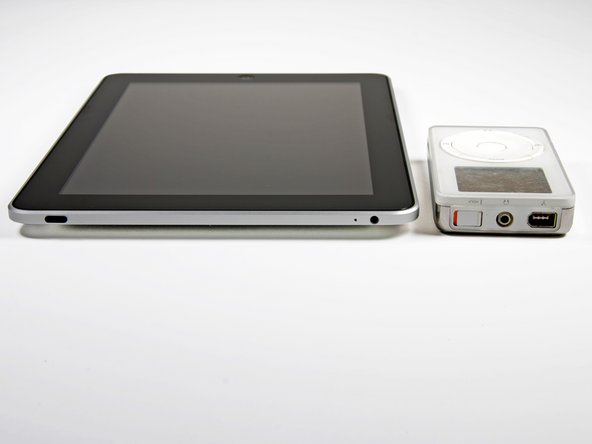










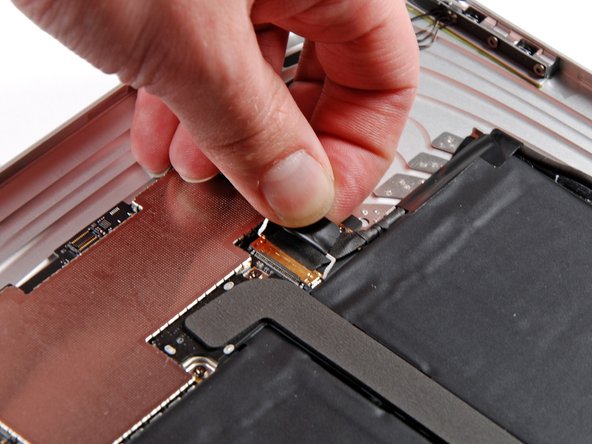




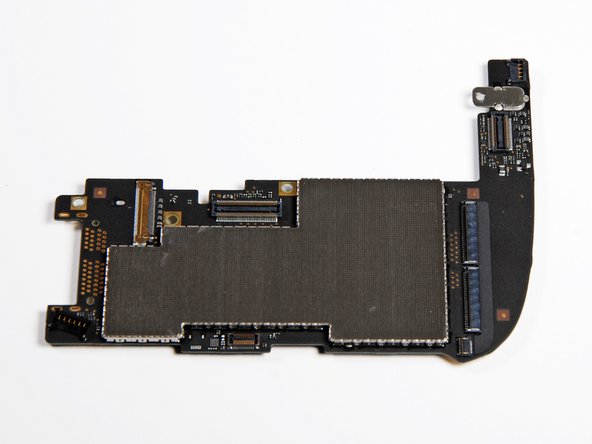
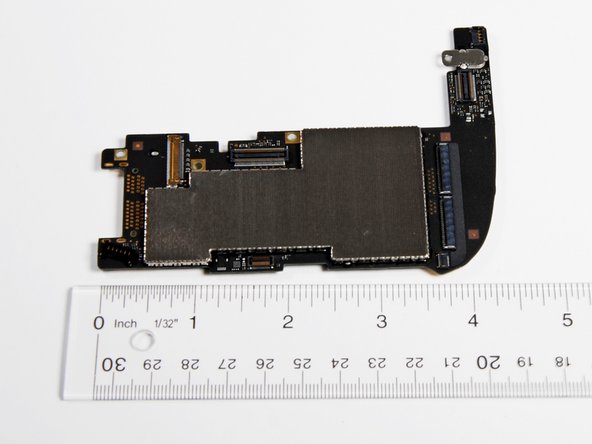

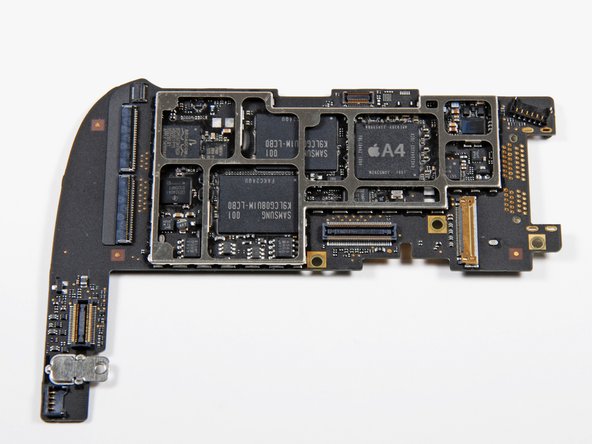

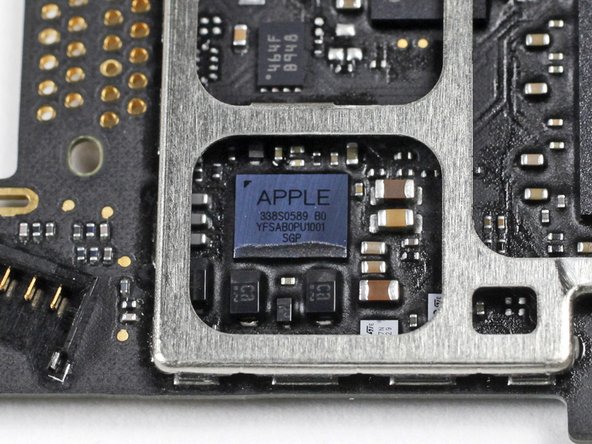










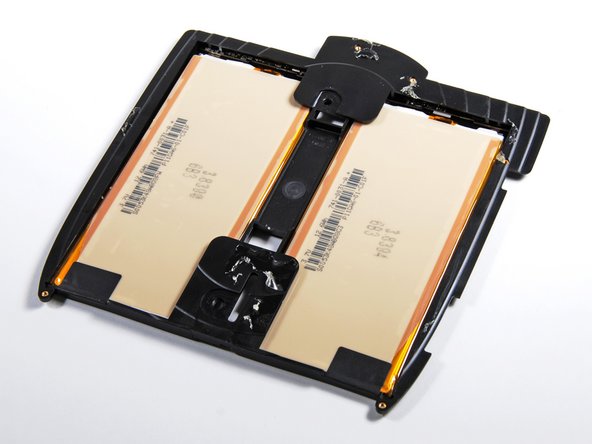

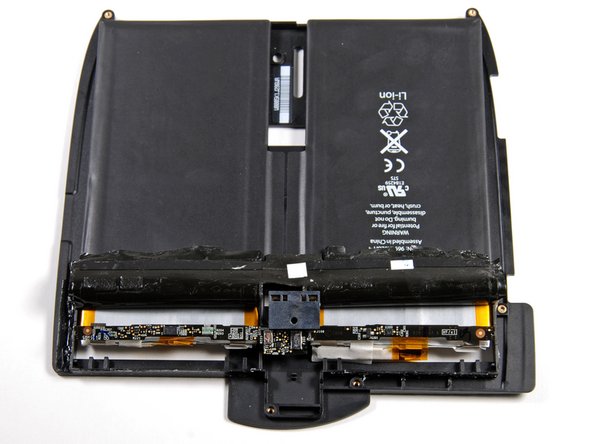


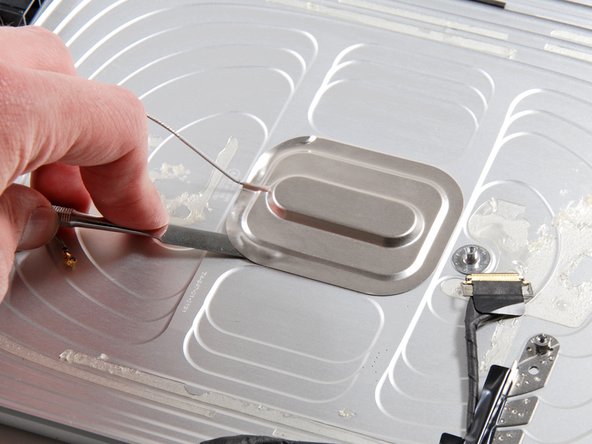
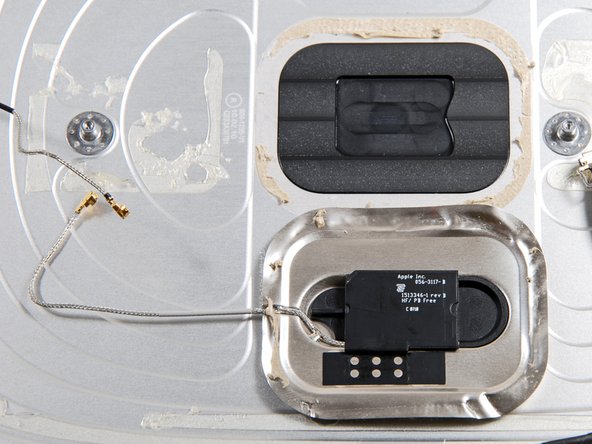







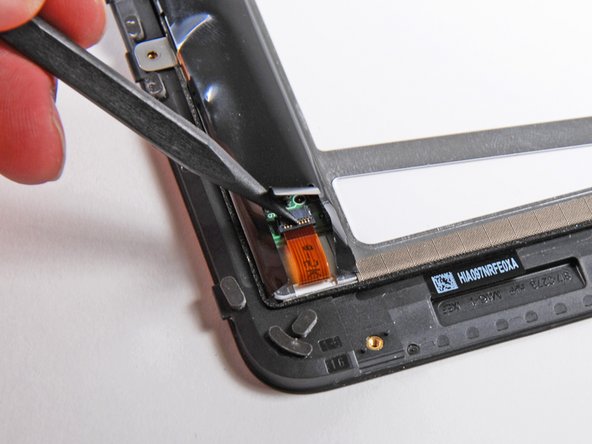
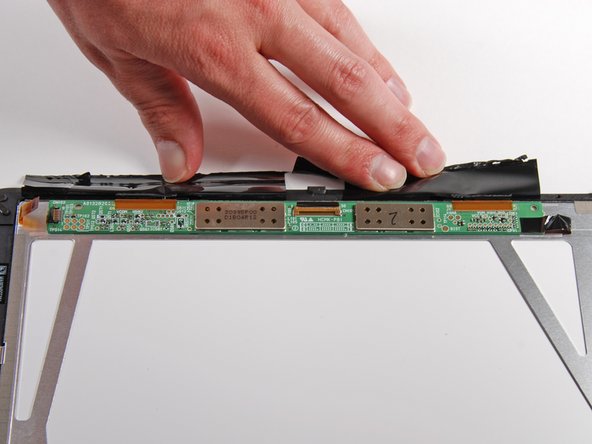

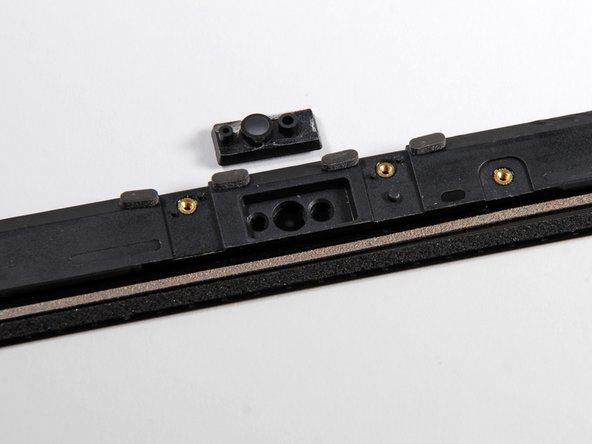

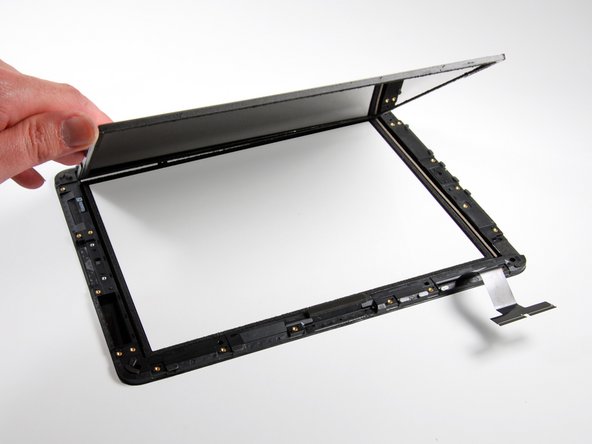
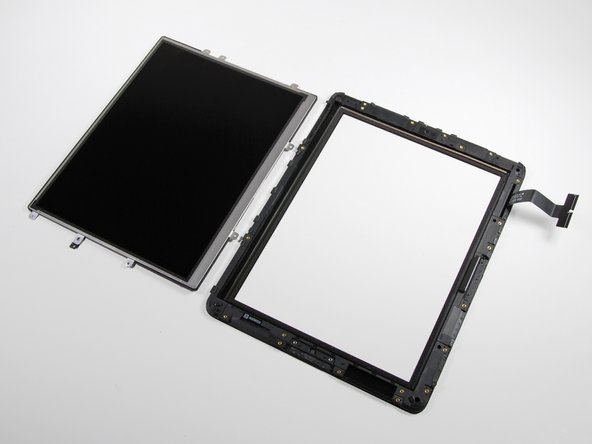
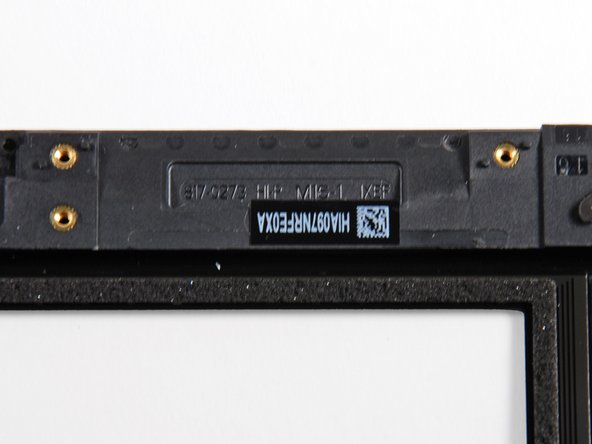
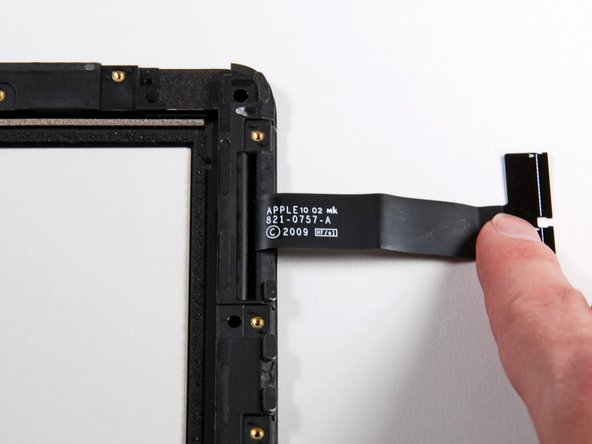

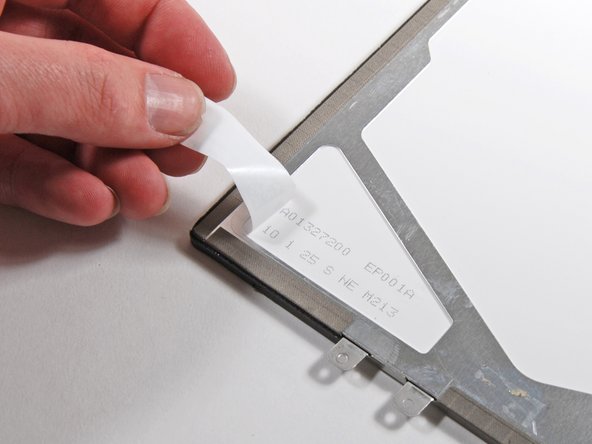


Congratulations!!!
I Love the iFixit!!! It's is always a pleasure to follow the site!!!
Ok, so I presume there is a lot of free sapce to make some mookup's in the iPad as like as to "add" a full USB connector and also a SD Card or MicroSD card connector.
So, is there any body available to please us with a "How To"???
Would be nice!!!
Best regards
Paulo Magrani
Vrumm - Reply
I tried the iPad today. It seems that the Wi-fi signal reception on iPad is a lot weaker than that of an iPhone. Do you have any explanations? Does this mean iPad has a subpar antenna installed?
xana - Reply
Apple confirms iPad Wi-Fi issues.
Joe Smith - Reply
It must to check RF test for Wi-Fi capability and update driver first,then review the antena design.
Karo Lin - Reply
Is it an iPhone but bigger?
Traiva - Reply
There's enough space to shove in a 160GB iPod hard disk!
That plus the SSD, you'll have enough space for tons of everything!
rootbrian2000 - Reply
very very wondurful to see this tear down
ramsoft86 - Reply
How can you open the case without leaving a mark? I tried with a very, very thing screwdriver and it left a tiny but noticeable mark on the silver casing
Jim - Reply